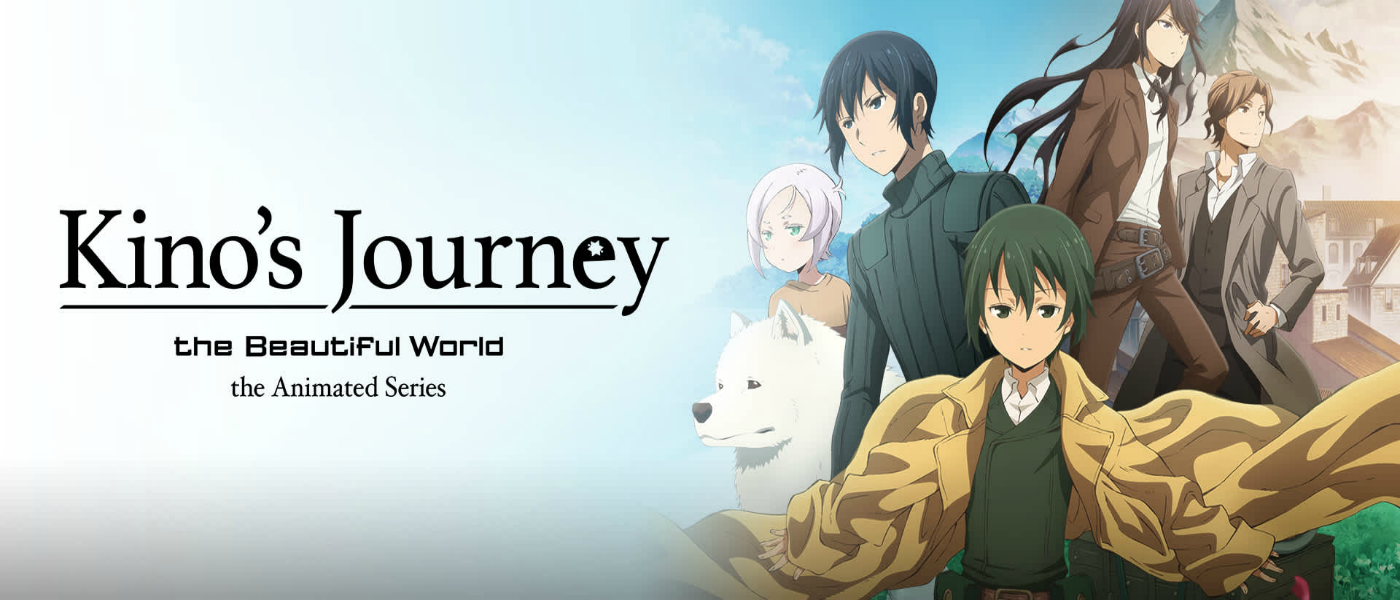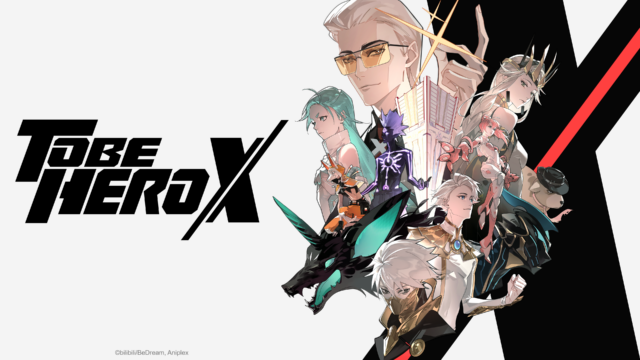English Dub Review: Kino’s Journey -the Beautiful World- “Country of Adults”
Amidst a sea of crimson flowers, Kino and Hermes relive the day they met.
Overview (Spoilers)
You read that preview, right? Okay. Let’s skip to the flashback.
Kino walks into town and gets a healthy sprinkle of some sort of powder. Oh, not the girl Kino we’ve known this whole time, but an adult male. He spots a young girl across the way and, seeing that she’s looking a bit down, goes to chat with her and ask for the nearest inn. The girl (whose name is not revealed, but is implied to be Sakura in the Japanese) is the child of two innkeepers and takes him with her there. The next morning, she is woken up by Kino tinkering with a machine in the yard. He had found it in the junkyard, and figured he could patch it up. When the girl shows interest in it, he explains. It’s a motorcycle. While it can go fast, it isn’t stable and requires a rider to command it. The two continue chatting, and the girl reveals that it is two days until her twelfth birthday. That’s a big thing for this country. That’s the day they perform a surgery on you that removes your inner child and makes you a compliant member of society that is willing to do something they hate because they are supposed to. They call this being an adult. Let this sink in: they lobotomize their children in a ritual to make them content, little Stepford robots. Kino doesn’t understand this ritual at all and prefers to just be himself. To be free to do as he pleases, and to do what he enjoys. This has some effect on the girl. The next morning, in front of many of the community leaders, she asks her parents if she could… you know… keep her whole brain. They freak out like the week’s out and start screaming at her with no remorse. They realize that all of this is because of the traveler, and go to confront Kino. He agrees that it isn’t his place to disrupt their society, and he doesn’t understand any of this. He also says that he was already planning on leaving. His three-day limit is up, and he also doesn’t feel safe there anymore. Then he spots the father holding a kitchen knife. They plan to kill the girl since she’s obviously defective. He throws himself in front of the blade, saving the girl’s life. She falls against his motorcycle and stares, blood-spattered, in shock and horror. She is pulled out by a voice behind her. The motorcycle itself asks if she wants to live, and tells her to hop on. The two ride off at maximum speed and escape the Country of Adults. Finally, they stop in a field of crimson flowers, and the girl names each of them. She is now Kino, and the motorcycle Hermes. Many years later, an older Kino lays down with Hermes in the same field and sings the songs of her youth.

Our Take
I am conflicted about this episode. It is powerful, juxtaposing the freedom of old Kino against the mindless servitude of the country. This brutal mutilation of children is so normal to them, it gives me the creeps. The anime visually separates those who are free by giving them a good amount of color, while those that have had the surgery are desaturated. As they turn on her, the residents of the town gain more contrast, making them look more severe. Their sudden shift from happy to homicidal gears happens even faster than I expected, shockingly so. Then, to see young Kino just sit there and watch as her impending doom approaches, my anxiety kicks into overdrive. When she finally swings herself over Hermes and dashes off, I am finally relieved. So yes, this episode does evoke emotion. But…
True to the fashion of this remake of the series, its depiction of the “bad society” is so ham-fisted, so overplayed, that it comes off disingenuous and bombastic. Throughout most of the series, we meet people who espouse systems of society we would consider abhorrent. It makes these people so gung-ho for their ideas that it trips an alarm in the viewer’s head. There is no way that anyone could really believe this is a good thing. But, they do, and without enough explanation as to why. The previous adaptation of this story gave us enough of the nuance in what is going on that it at least felt plausible. The same visual cues that amp up the tension are also responsible for taking things too far. We are given this extreme lighting in a few scenes, bathing children’s faces in the blood-red light as they hear about their fate or painting adults in a sickening, desaturated green as they treat those children as property. What could have been used to simply suggest is taken to such extremes that it screams that content from the mountaintops. Subtlety is lost, and you are told what to feel about these people. They are sickeningly bad. Sure, they really are in my opinion. However, by punching me in the face, the writers and directors miss out on an opportunity to make young Kino’s separation from her society more meaningful. By making this darkness insidious and reasonable, instead of psychotic and unhinged, they could have made you anxious about her asking not to go through with the surgery. Instead, they push so hard, they end up flat on the ground.
The previous anime also cared about its character arc in ways that this show does not. In the original, this episode was the fourth in the series. This made the reveal of Kino’s past a bit more shocking because we hadn’t already had several characters state that she was a girl. Then, after seeing this backdrop for Kino’s story, you could easily see how “A Kind Country” has emotional impact for Kino. Instead, this adaptation flips the two, negating the rhyme. You are no longer conscious of the parallel of Kino’s origins and the innkeepers’ daughter of “A Kind Country”. If viewed in the order the original show presented, you become aware that Kino finds herself failing to save a child from the decisions of their parents, and it meant something because she herself was rescued from a bad situation. Now, because it is flipped in order, we are given the impression that they are separate stories, and not emotionally connected at all. The show is too concerned with making its characters look cool than it does making them feel fleshed out and relatable.
Score
Summary
While on my first watch-through of it this seemed like a good episode, I feel like it missed the mark when I give it a hard look. Subtlety is lost on the director of this adaptation, rendering the show an exercise in jumping sharks. I give it six lobotomies out of ten.























"There are also other characters that come and go (also owned by the Warner Bros. Discovery conglomerate media company)."
Huh. Is that just referring to other characters from the show itself, or is this implying that the new season is going to have cameos from other WBD IPs